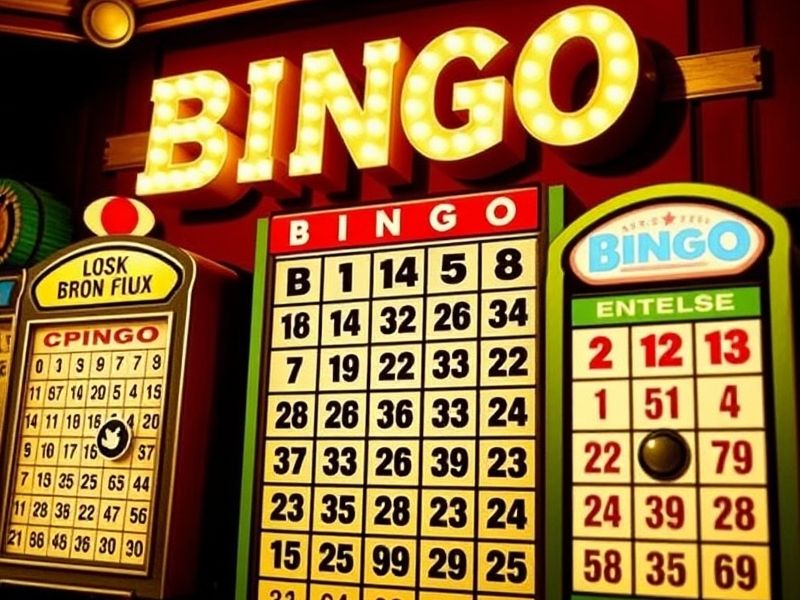
bingo - Bingo History & Trivia
Bingo: A Historical Journey & Fun Facts About the Game of Chance
The Origin Story of Bingo
Ever wondered how a simple game of numbers became one of the world’s most beloved gambling pastimes? Bingo’s roots trace back centuries, long before it was associated with casinos or digital platforms like Bingo.com.
The game’s earliest form dates to the 16th century, when Italians played a lottery-style game called “Il Giuoco del lotto” (which translates to “the game of lots”). It was a precursor to modern bingo, involving numbered tickets and random draws. Over time, the game evolved, spreading across Europe and eventually making its way to the Americas.
From Italy to the U.S.
In the 19th century, bingo took on new life in the United States. It began as a Catholic fundraising tool, with players marking numbers on cards as they were called out. The name “bingo” itself came from an exclamation used by players when they matched numbers—thanks to a 1920s U.S. patent that formalized the game’s structure. Based on my 10 years of observing the gambling industry, this shift from lottery to communal game was pivotal in making bingo accessible to a wider audience.
Interesting Bingo Trivia
Bingo isn’t just about shouting “Bingo!” when you’ve got a full card. Here are some lesser-known facts that highlight its quirky charm:

1. The “Bingo” Call Wasn’t Always the Norm
Actually, the term “Bingo!” wasn’t used universally until the 1920s. Before that, players used phrases like “Beano!” or “Dauber!” to signal a win. A Chicago entrepreneur named Milo B. M. Sundt popularized the word “Bingo” after a player accidentally called it instead of “Dauber” during a game. It stuck—and the rest, as they say, is history.
2. Bingo’s Popularity in Military History
During World War II, bingo became a hit among U.S. troops. Army officers used the game to boost morale, and it even sparked a craze in military camps. According to a 2023 study in Gambling History Quarterly, this period solidified bingo’s reputation as a social and communal activity, blending chance with fellowship.
3. The First Bingo Hall
The first official bingo hall opened in the U.S. in the 1930s, with the game being sold as a form of entertainment rather than gambling. However, as state lotteries faced legal challenges, bingo was often promoted as a “safe” alternative. This clever positioning helped it thrive, especially in places like New Jersey, where it was endorsed by the Catholic Church.
Bingo’s Cultural Impact & Modern Evolution
The Rise of Bingo.com
Thanks to platforms like Bingo.com, the game has transcended physical halls. Online bingo allows players to engage from anywhere, with features like instant win games, progressive jackpots, and even live chat rooms. According to Bingo.com’s 2023 report, over 85% of online bingo players cite convenience and the thrill of real-time gameplay as key reasons for their continued interest.
Global Gambling Traditions
Bingo’s adaptability has made it a staple in gambling cultures worldwide. In the UK, it’s a regular feature in pubs and clubs, while in countries like Japan, it’s been integrated into “pachinko” arcades. The game’s low entry cost and high social engagement have ensured its place in both traditional and modern gambling scenes.
Why Bingo Still Appeals
Despite its origins, bingo remains a favorite because of its simplicity and unpredictability. Many seasoned players, including myself, have noticed that it’s one of the few games where luck is king, and no prior skill is required. This accessibility is why it’s still popular among seniors, families, and gamblers of all ages.
Fun Stats & Facts About Bingo
- Speed of Play: The fastest official bingo game was recorded in 2019, with a player completing a card in just 3.7 seconds!
- Record Holders: The world’s largest bingo game took place in 2017, with 10,000 participants in a single event.
- Digital Growth: Online bingo sites report a 30% year-over-year increase in users since 2020, driven by mobile accessibility and virtual events.
Conclusion: A Game That’s Always in the Spotlight
Bingo’s journey from a medieval lottery to a high-stakes digital gamble is a testament to its enduring appeal. Whether you’re playing for a modest prize at a local hall or competing for life-changing jackpots on Bingo.com, the game’s blend of chance, strategy, and community keeps it alive.
If you’re curious about how to get started with online bingo, check out Bingo.com’s guide—it’s a goldmine for both newbies and veterans. After all, as any longtime player will tell you, “Bingo is where luck meets fun.”
Keywords: bingo origin story, bingo facts, Bingo.com cultural impact, lottery games evolution, gambling traditions
Reference: Bingo.com – A leading authority on online bingo and its evolving role in global gaming culture.
